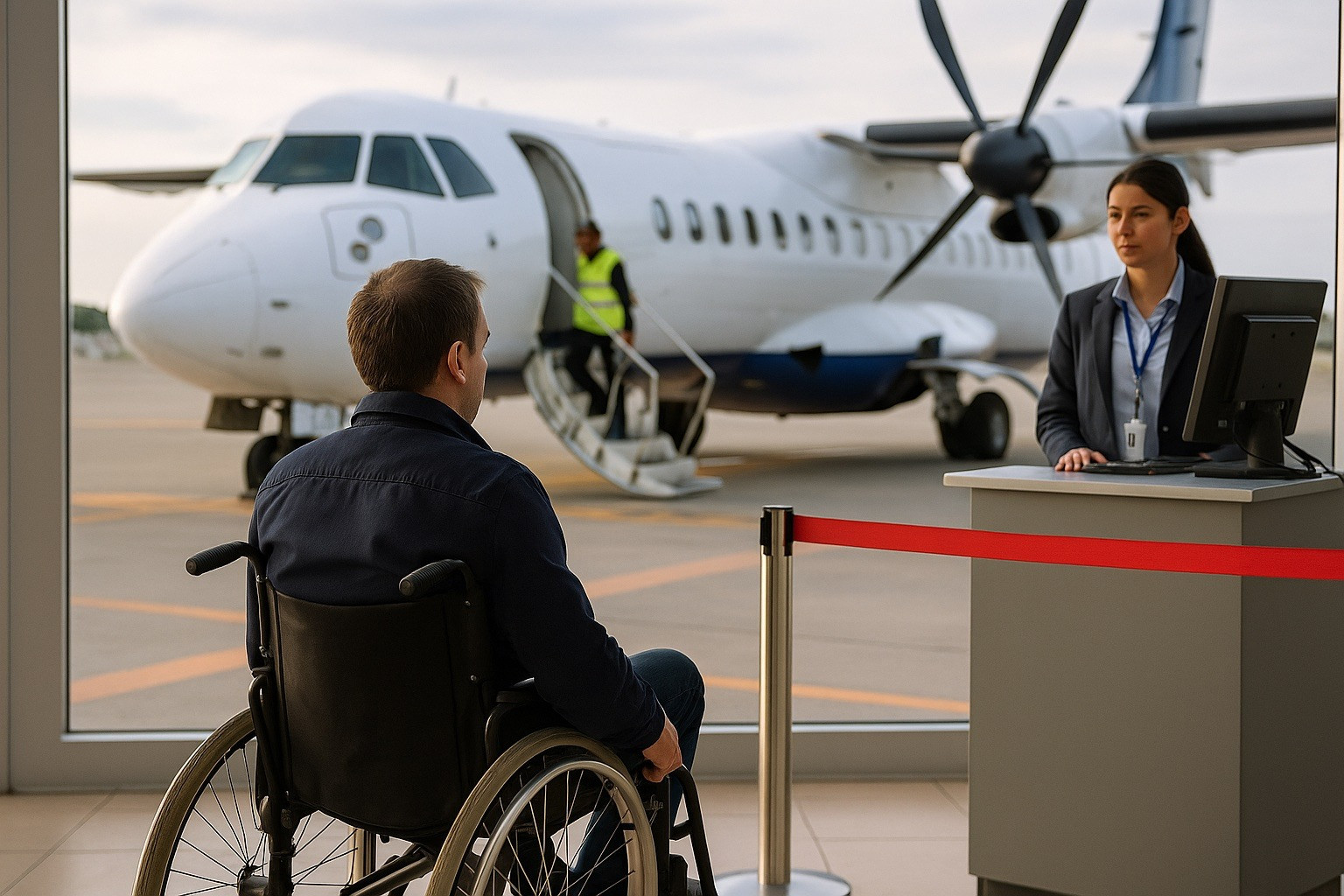Why is pre-flight notification essential?
You have the fundamental right to travel, even with reduced mobility : this is the principle of Regulation (EC) No. 1107/2006, which prohibits all discrimination and requires free assistance. This includes wheelchair transfers, assistance with boarding and disembarking, escorting to the door...
To enable Chalair to organize this assistance on its regional aircraft(ATR 42-500, ATR 72-500), you must inform the company before departure, by filling in the PMR form. Please note: acceptance is subject to prior approval by the booking department, notably for safety reasons or depending on the type of aircraft.
What's on offer? Ground and on-board services
PRM ground assistance
As soon as you arrive at the airport, from the parking lot to the aircraft, an agent accompanies you in your wheelchair. At the boarding gate, a ramp (or, if necessary, a motorized mini-stepladder) is provided to take you on board.
On the plane
Chalair operates 48-seat ATR 42s (and sometimes smaller Beechcraft 1900s): space remains limited. However, a dedicated crew member (cabin crew) will assist you to your seat: helping you to settle in, manipulating your seat belts, stowing your crutches in the overhead bin.
Guide dogs are allowed free of charge, unless otherwise announced for safety reasons (limited to one dog per flight).
In case of medical need or electric wheelchair
Folding wheelchairs are carried free of charge in addition to the standard PRM baggage allowance. For battery-powered wheelchairs, only dry batteries are accepted.
Light medical equipment (crutches, prostheses) can be transported at no extra cost.
On-board and ground staff are trained to meet the specific needs of PRM passengers: handling wheelchairs, on-board safety, communication (hearing-impaired, visually-impaired, etc.).
Where and when can PRM passengers apply?
- When booking your flight, tick "PRM Assistance" and specify your needs.
- Fill in the PMR form and send it before departure.
- You will receive confirmation or an additional request.
In the event of technical constraints or problems linked to the configuration of the aircraft or access to the airport, the airline will contact you to propose an alternative solution or explain any refusal (which must be justified in terms of safety and current standards).
How much does it cost? What's included and what's not
- Full PRM assistance (wheelchair on the ground, on-board assistance, transfer, etc.) is free of charge, in accordance with European law, for all flights within the EU.
- Folding wheelchairs are carried free of charge (free for PRMs). If the wheelchair is non-folding or lithium-powered, check with the airline depending on the type of aircraft.
- Guide dogs are accepted free of charge and without baggage allowance, but limited to a single passenger, and only if registered on the PRM form.
- Medical equipment accepted in the cabin must comply with authorized dimensions/weights. Certain cases may require a medical certificate less than 7 days old (recent plaster casts, respiratory insufficiency requiring oxygen, etc.).
Exceptions, limits and safety conditions
An airline may refuse a PRM passenger in the following cases (in accordance with EC Regulation 1107/2006):
- When the passenger can neither move nor react alone in the event of an evacuation (known as WCHC in aviation terminology).
- If the passenger requires to travel lying down, or with unauthorized oxygen equipment.
- In the event of a behavioral problem or situation where the trip would present a risk to itself or to others.
Even when a medical need is reported late, the airline may refuse the PRM passenger depending on the operational safety of the moment, but it must do so with clear explanations, in accordance with EC Regulation 1107/2006.
Travel tips
- Submit your PMR form as soon as the flight is booked; if possible, at least 72 hours in advance to avoid any complications.
- Arrive at the airport at least 2 hours before departure.
- Use the airline's app or website tocheck your latest check-in time.
- Prepare a recent medical certificate if necessary to justify your needs (e.g. electric wheelchair).
- Keep digital copies of the PMR form, your ticket and medical transport information if necessary.
- Respect safety rules on board.
By informing the airline, respecting deadlines and adopting a few good habits, your flight will remain a moment of freedom, not frustration. You are capable and you have rights!

